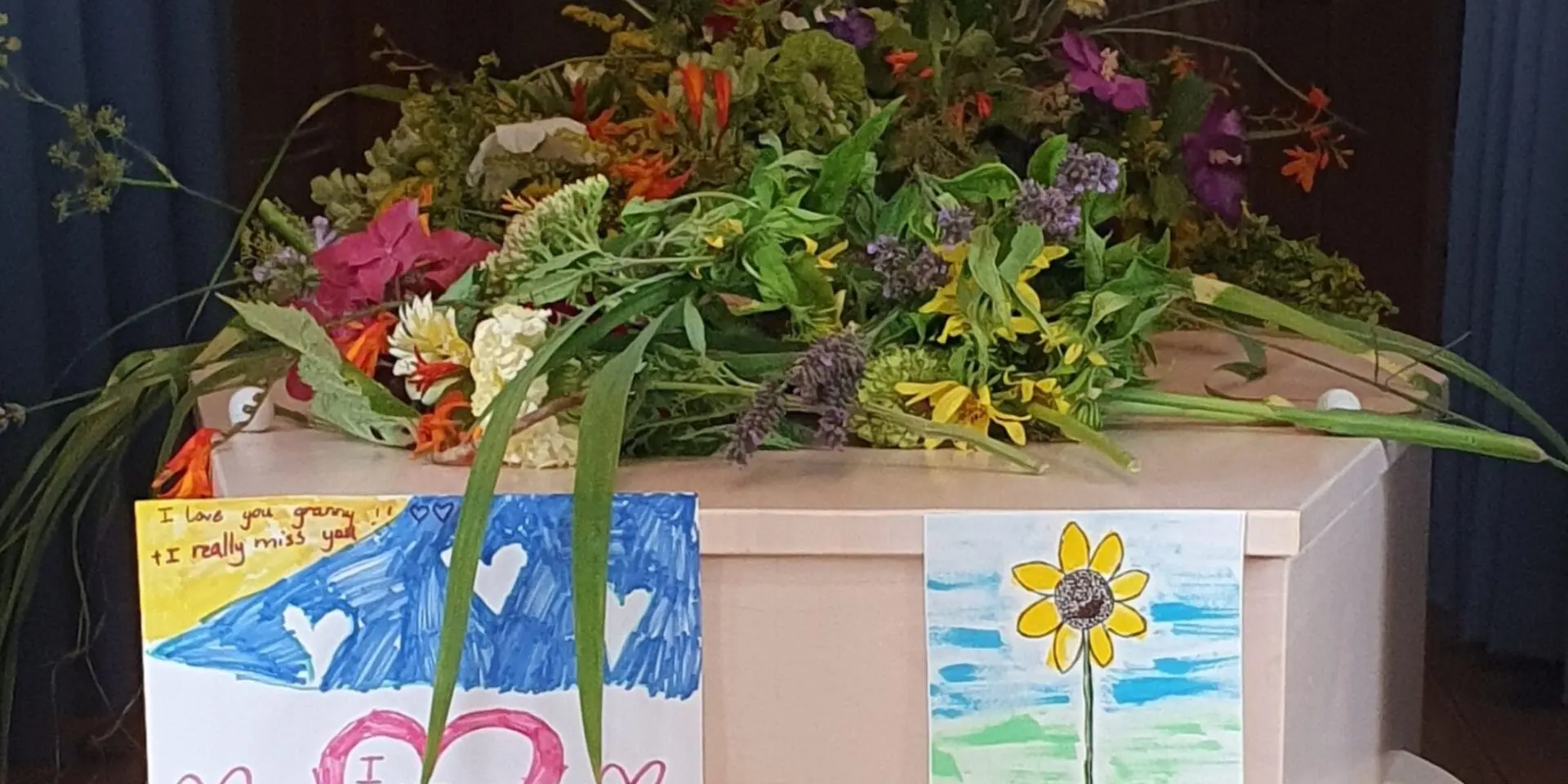This article has been written by Poppy’s and shares creative ways that children and young people can be involved in funerals.
Poppy’s is an independent funeral director, based in London. We often support families with children to prepare for a funeral. We encourage and empower them to get involved however feels right for them.
Being involved doesn’t have to mean being the centre of attention. With a bit of creative thinking, you can find different ways to take part that suit each individual child or young person.
There are so many different age-appropriate ways for children and young people to express their grief and say goodbye to someone they care for – before, during and after the funeral ceremony. In sharing our experience and practical advice here, we hope to inspire your own ideas.
Decorating the coffin
At Poppy’s, we often invite people into our space to decorate a coffin or enable them to take the coffin away to decorate it at home.
You can use paint, pens or stickers to decorate a cardboard coffin, or attach photos, sheet music, hand-drawn pictures, newspaper cuttings or anything else that is special to you. We’ll always advise if there’s anything that won’t be suitable for cremation or natural burial.
Coffin decoration is an activity that a child of any age can take part in – whether by writing a message, drawing a picture or adding their favourite stickers. It’s also a good opportunity for family and friends to gather together to share stories and memories, without the formality or pressure of the funeral.
Other types of coffins can also be decorated, for example by weaving flowers and messages into a willow coffin or placing drawings onto a wooden coffin.
Reading, singing or playing in the ceremony
Playing a musical instrument, reading a poem, or singing a song are all ways that children and young people can take part in the funeral ceremony.
However, standing up in front of a lot of people can be daunting – so we have found that it helps for another child or supportive adult to stand alongside them at the front. Or when several children, perhaps a group of grandchildren, read one verse or line of a poem each, so that they share the experience and support each other.
Taking part in the ceremony in other ways
There are plenty of ways to take part in the ceremony which don’t require standing at the front!
We remember three small children who stuck ladybird stickers on all the orders of service, as their mum loved ladybirds, as well as many occasions when children gave out the orders of service or distributed individual flowers to put on the coffin.
Your funeral director or celebrant should also be able to find ways to involve children in setting up the service space on the day if they feel comfortable doing that. This way it becomes more familiar and starts to feel like their space.
For example, at a recent Poppy’s funeral, one young girl helped place electric tea lights around her grandma’s coffin to brighten up the service space. In another, a young boy was the one to press the button in the crematorium chapel at the committal. It was exciting for him, while also being an important, symbolic moment.
Spending time with the person who has died
It’s absolutely possible for children to visit someone who’s died. We’ve welcomed families of all shapes and sizes into Poppy’s to visit a parent, grandparent or other relative in our Friends and Family room. Or we can arrange to bring someone home before their funeral.
“We brought a grandpa home the day before the funeral. We laid him on the family’s coffee table and as we lifted the coffin lid, the young children reached in to touch him and hold him. One of the youngest children climbed right onto the table in order to reach her grandpa. It struck me that children don’t see the barriers we put up between the living and the dead. This was their grandpa, and he was home.” – Funeral Director from Poppy’s
Accompanying the coffin
We always welcome adult family and friends as bearers to carry the coffin, and children can play their part too, by walking with the coffin as it enters the service space; or gathering round the coffin during the ceremony to touch it, say final words, leave flowers or attach messages.
At a burial, children can put messages or items of special significance into the grave or help re-fill it with soil. At a recent funeral for a man who worked with owls and birds of prey, his grandchildren decorated bunting with picture of his beloved birds, which was buried with him.
Providing memories and mementoes
Some children won’t want to, or be able to, attend the funeral itself. Others will be there on the day but be too young to remember it afterwards.
Some families choose to take photos or record the ceremony, so that young children will have something to look back on when they are older.
A flower from the top of the coffin or an order of service are mementoes which can be given to a child after the funeral, whether or not they attend any or all of the ceremony.
At the funeral, it’s helpful to have a designated adult on hand, so that if a child changes their mind about attending just before or halfway through, they can be looked after by someone they trust.
Taking time to listen
Perhaps the most meaningful way to involve a child or young person in a funeral is to listen to their worries or questions and to take the time to answer properly.
We often answer really honest and practical questions from children at funerals, from ‘what’s my mum wearing in the coffin?’ to ‘is that my nanna in the box?’
We always take care to reassure them in clear age-appropriate language, but without using euphemisms or hiding the truth.
Within families, these questions can be a springboard to exploring deeper feelings and sharing memories.
Why involve children and young people in a funeral?
With care and support, children and young people can benefit from having the opportunity to attend, and take an active, creative part in a funeral. It gives them a chance to express some of their grief and their love, which can bring joy and comfort to other guests at the funeral too.
It can also lighten the atmosphere, especially when babies or small children are present, reminding everyone that death is a natural part of life.
Poppy’s is an independent funeral director, based in London. We take a fresh approach to funerals, encouraging people to plan a funeral that’s right for them. We share stories, tips, interviews and ideas on our weekly Talking Death blog, and we offer the opportunity for people to talk about their funeral wishes in advance with us, using our free My Funeral Wishes service.
Header Image Provided By Poppy’s.

How to get grief support
If you would like help to support a child or young person after the death of someone, Winston’s Wish are here to help. Winston’s Wish provides support for children, young people up to the age of 25 and adults supporting them.
You can call our Freephone Helpline on 08088 020 021 (8am-8pm, Monday to Friday), email us on ask@winstonswish.org or use our live chat (open 8am-8pm, Monday to Friday). Our practitioners are here to listen, can offer immediate guidance and resources and tell you what support we can offer and what might be most suitable for you.
Our Winston’s Wish Crisis Messenger is available 24/7 for urgent support in a crisis. Text WW to 85258.

You might also like

Supporting a bereaved child who has autism
There are many stereotypes as to what a person with autism ‘looks like’, ‘acts like’ ‘understands’ and ‘feels’. All children are individuals – all children with autism are individuals. Here is a range of things to consider when supporting a bereaved child who has autism.

Preparing a child to attend a funeral
The involvement of children and young people in funerals and other rituals following a death will, of course, vary in families depending on their cultural and religious beliefs, but it can help children if they can see for themselves rather than let their imaginations run riot. Here are ways in which you can prepare a child for attending a funeral.


